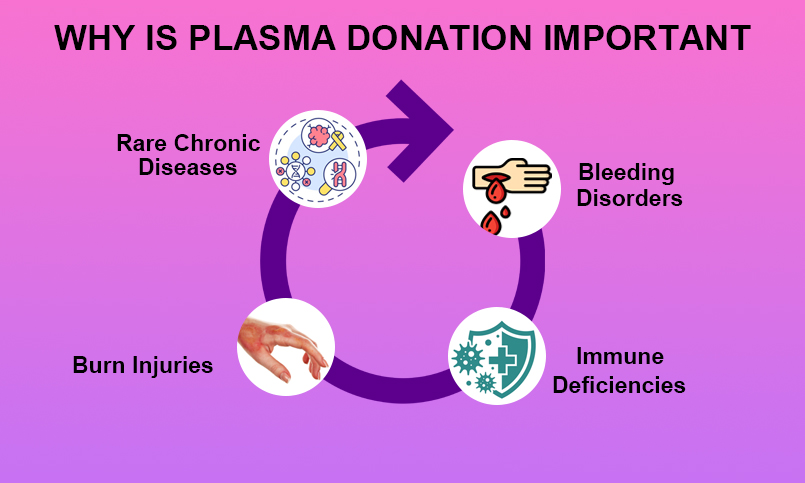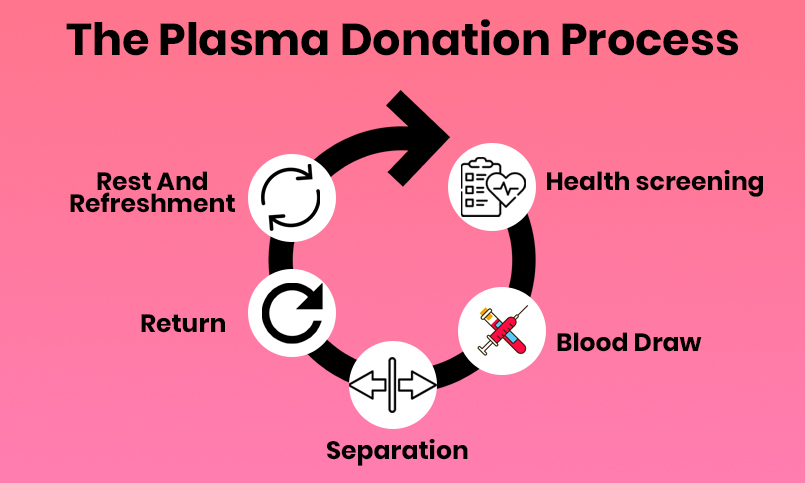As you know very well, pregnancy is a time of great change and responsibility. Many expectant mothers wonder how they can continue to help others during this special period. One question that often comes up is: Can I donate plasma while pregnant?
Here in this detailed guide, we will dive deep into the world of plasma donation and its implications for pregnant women. We’ll explore the process, potential risks, and guidelines to help you make an informed decision. Remember, your health and your baby’s well-being should always come first!
What is Plasma?
You know very well that plasma is the liquid part of your blood. It’s mostly water, but it also contains important proteins, antibodies, and other substances that help your body function. When you donate plasma while pregnant, your blood is drawn and then separated into its components. The plasma is kept, and the rest of your blood is returned to your body.

Why is Plasma Donation Important?
Plasma donations are crucial for many medical treatments. They help people with:
- Bleeding disorders
- Immune deficiencies
- Burn injuries
- Rare chronic diseases
Your plasma donation could literally save someone’s life!

The Plasma Donation Process
Here we are sharing a quick rundown of what happens when you donate plasma:
1. Health screening: You’ll answer questions about your health and have a quick physical exam.
2. Blood draw: A needle is inserted into your arm to draw blood.
3. Separation: Your blood goes through a machine that separates the plasma.
4. Return: The rest of your blood components are returned to your body.
5. Rest and refreshment: You’ll stay for a short time to make sure you’re feeling okay.
The whole process usually takes about an hour to an hour and a half.

Health Considerations During Pregnancy
Pregnancy is a unique time for your body. Let’s look at some key health factors to keep in mind:
Changes in Blood Volume
During pregnancy, your body increases its blood volume by about 50%. This extra blood helps support your growing baby.
Nutritional Needs
Pregnant women need more of certain nutrients, including:
- Iron
- Folic acid
- Calcium
- Protein
These are crucial for your baby’s development and your own health.
Immune System Changes
Your immune system undergoes changes to protect your baby. This can make you more susceptible to some infections.
Fatigue and Energy Levels
There are lots of pregnant women who experience fatigue, especially in the first and third trimesters.
Potential Risks of Plasma Donation During Pregnancy
Now, let’s address the big question: What are the potential risks of donating plasma while pregnant?
1. Dehydration: Plasma donation can lead to fluid loss, which could be risky during pregnancy.
2. Anemia: Pregnancy already increases your risk of anemia. Donating plasma might worsen this.
3. Dizziness and fainting: These are common side effects of plasma donation and could be more likely during pregnancy.
4. Reduced nutrient supply to the baby: Your body needs those nutrients to support your growing baby.
5. Increased stress on the body: Pregnancy already puts extra demands on your body. Plasma donation could add to this stress.
6. Potential for complications: In rare cases, plasma donation could lead to complications that might affect your pregnancy.
It is really good to note that these risks are potential, not guaranteed. Every pregnancy is different, and what’s risky for one woman might be fine for another.
Guidelines and Regulations for Plasma Donation
Most plasma donation centers have strict rules about who can donate. Let’s look at some common guidelines:
General Eligibility Requirements
- Age: Usually between 18 and 65
- Weight: Typically at least 110 pounds
- Good overall health
- No recent tattoos or piercings
- Not currently taking certain medications
Pregnancy-Specific Guidelines
Most plasma donation centers do not allow pregnant women to donate. This is for several reasons:
1. To protect the health of the mother and baby
2. To avoid potential liability issues
3. Because pregnancy can affect the quality of the plasma
Some centers also have waiting periods after pregnancy before you can donate again. This can range from 6 weeks to 6 months after giving birth.
Consulting Your Healthcare Provider
Before making any decision about plasma donation during pregnancy, it’s absolutely crucial to talk to your healthcare provider. They know your individual health situation and can give you personalized advice.
- Plasma Donation After Pregnancy
When you’ve had your baby and your doctor gives you the all-clear, you might consider donating plasma again. Here’s what you need to know:
- Waiting Period
There are lots of donation centers that require you to wait at least 6 weeks after giving birth before donating plasma. Some may require a longer wait, up to 6 months. This allows your body time to recover and replenish its resources.
- Breastfeeding Considerations
If you’re breastfeeding, you might need to wait until you’ve stopped before donating plasma. Breastfeeding requires extra fluids and nutrients, which could be affected by plasma donation.
- Health Check
Before donating, you’ll need to go through the usual health screening process. This ensures you’re healthy enough to donate safely.
- Gradual Return
Even if you’ve been cleared to donate, consider starting slowly. Maybe donate less frequently at first to see how your body responds.
- The Importance of Self-Care
Remember, taking care of yourself is crucial, especially after pregnancy. Don’t push yourself to donate if you’re feeling tired or run down.
Also Read More: Anxiety During Pregnancy
Conclusion: Safety First for Expecting Mothers
In the end, the answer to “Can I donate plasma while pregnant?” is usually no. Most donation centers don’t allow it, and for good reason. The potential risks to you and your baby outweigh the benefits of donation.
But don’t let this discourage you! Pregnancy is a time when you’re already doing something incredible – growing a new human being. That’s a pretty amazing way to contribute to the world.
FAQs
1. Can I donate plasma in the early stages of pregnancy before I know I’m pregnant?
It is really good to avoid plasma donation if there’s any chance you might be pregnant. Many centers will ask about the possibility of pregnancy during the screening process.
2. Will donating plasma harm my baby if I donate before I know I’m pregnant?
Lots of people are asking about donating plasma while pregnant cause harm and the answer is, it’s unlikely to cause harm if it happens once, it’s best to stop donating as soon as you know you’re pregnant and consult with your doctor.
3. How long after giving birth can I start donating plasma again?
Lots of centers require at least 6 weeks, but some may require up to 6 months. Always check with your doctor first.
4. Can I donate plasma while breastfeeding?
There are lots of centers that don’t allow plasma donation while breastfeeding. Check with your specific donation center and consult your doctor.
5. Are there any long-term effects of donating plasma during pregnancy?
There isn’t enough research to say for certain. This is one of the reasons why donation during pregnancy isn’t recommended.

